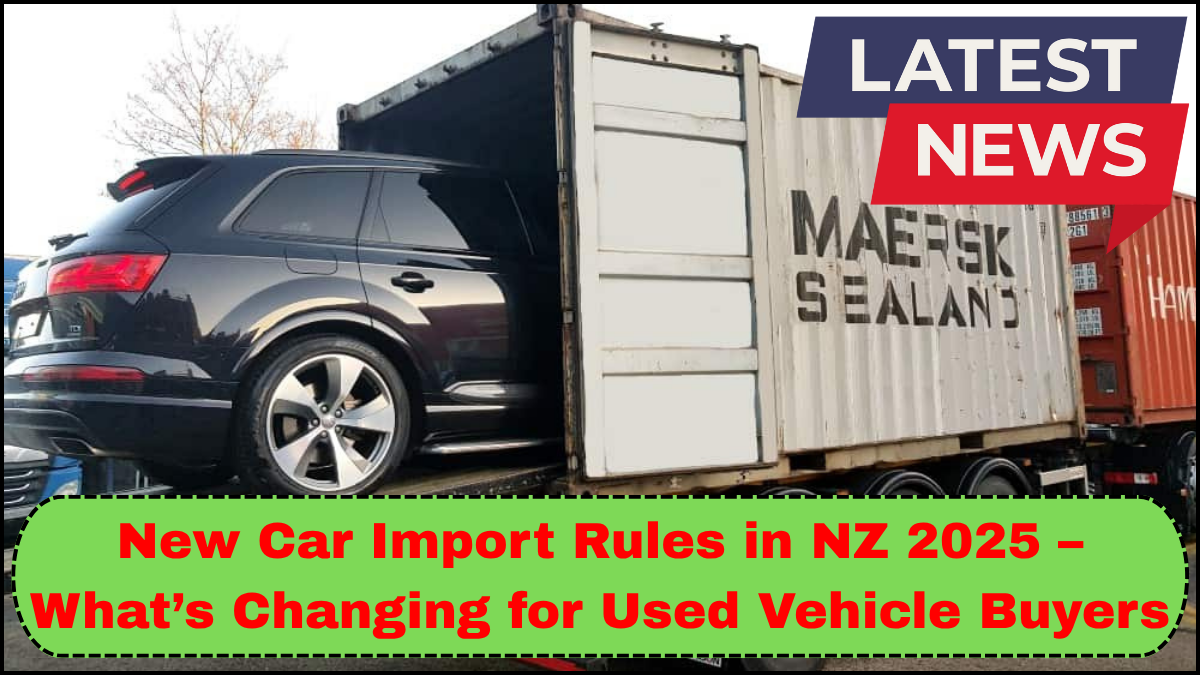New Zealand’s vehicle import regulations are set for a major shake-up in 2025. The NZ Car Import Rules Update introduces stricter compliance standards, particularly affecting used vehicles sourced from overseas. These changes are designed to align with environmental goals, safety benchmarks, and consumer protection measures.
For used vehicle buyers—especially those interested in Japanese cars, which dominate NZ’s import market—it’s crucial to understand what these changes mean. Below, we break down the key updates, what they imply for importers and consumers, and how to stay compliant.

Emission Standards Are Getting Tougher
One of the central changes in the 2025 update is the tightening of emission standards. Vehicles imported into New Zealand will now need to meet Euro 6 emission levels (or equivalent for Japanese Domestic Market vehicles). This aims to reduce harmful exhaust pollutants and bring imported vehicles in line with climate change commitments.
For used car buyers, this means:
- Older vehicles, especially pre-2012 models, may no longer qualify for import unless retrofitted.
- Japanese cars, a staple of NZ imports, must now meet stricter testing to prove compliance with new emission thresholds.
This change could reduce the pool of eligible used vehicles but may result in a higher standard of imports overall.
Stricter Safety and Crash Standards
Safety compliance is another area receiving a significant overhaul. The NZ Car Import Rules Update mandates more rigorous testing for crashworthiness, Electronic Stability Control (ESC), and autonomous braking systems in imported vehicles.
Buyers should be aware:
- Imports must have verified crash test ratings equivalent to Australasian NCAP standards.
- Vehicles without modern safety features may be denied entry or require expensive modifications.
This shift could raise upfront costs but ensures a safer driving environment for all.
Age Limit Caps for Used Imports
Previously, there was more leeway in importing older cars as long as they passed compliance checks. From 2025 onward, a new age cap will be enforced:
- Light vehicles must be under 8 years old at the time of import.
- Exemptions will be rare and typically limited to classic or collector vehicles.
This rule aims to modernize the national fleet, cut emissions, and reduce safety risks. However, it could limit choices for budget-conscious buyers.
Revised Compliance Inspection Procedures
The compliance process is also being streamlined and tightened:
- Vehicles must undergo pre-export inspections from NZTA-approved agents.
- On-arrival inspections in New Zealand will include digital VIN verification, advanced emissions testing, and full structural integrity checks.
- Compliance fees may rise due to more in-depth processing and documentation requirements.
Importers and buyers must ensure all paperwork is complete and accurate to avoid delays or rejections.
Impact on Japanese Car Imports
Japanese cars have long been a favorite for NZ buyers due to their affordability, reliability, and variety. However, the 2025 rules could limit the number of eligible Japanese imports:
- Japan’s own regulations will need to align closely with NZ’s, particularly around emissions.
- Certain Kei cars and performance models may face import bans or require modifications.
Importers focusing on Japanese stock will need to be more selective and strategic to meet the new thresholds.
How Buyers Can Prepare
For individuals planning to purchase a used imported vehicle post-2025:
- Work with licensed importers who understand the new rules.
- Request full compliance documentation before committing.
- Focus on vehicles under 8 years old with strong safety and emissions credentials.
- Budget for potential increases in inspection and compliance fees.
Staying informed and proactive will be essential in navigating the updated landscape.
FAQs
Q: When do the new import rules take effect?
A: The updated regulations come into force on January 1, 2025.
Q: Can I still import a 10-year-old car?
A: Generally, no. Vehicles must be under 8 years old unless they qualify for a rare exemption (e.g., classic cars).
Q: Will compliance costs increase?
A: Yes. Enhanced inspections and documentation requirements are likely to raise compliance-related fees.
Q: Are these rules only for used cars?
A: No, but used imports are most affected due to stricter criteria on age, safety, and emissions.
Q: Do these rules affect all countries or just Japan?
A: The rules apply globally, but Japanese cars are particularly impacted due to their popularity and market share in NZ.
click here to learn more